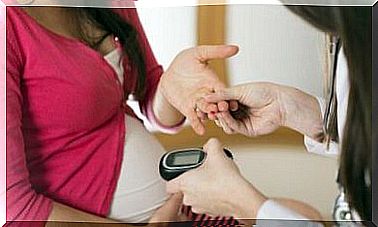The Relationship Between Vitamin D And Pregnancy

In recent years, those who show low levels of vitamin D have increased during their annual or monthly blood tests. As it is clear that a deficiency leads to bone and immune problems, experts have established a link between vitamin D and pregnancy.
Did you know that about 20 to 40 percent of pregnant women have insufficient values for this type of vitamin? This is sometimes a problem both for the mother and for the proper development of the fetus.
This vitamin is involved in the proper implantation of the fetus in the womb. A deficiency increases the risk factor for preeclampsia and gestational diabetes, among other diseases. Do you want to know more? Continue reading.
Vitamin D and women’s health
It is a hormone that is synthesized from the 7-dehydrocholesterol present in the skin when exposed to the sun’s ultraviolet rays. It is also found in foods rich in fat, such as egg yolks, dairy products and fatty fish.

One of its functions is to promote the intestinal calcium absorption to strengthen the bones. It is also responsible for maintaining the integrity of the intestinal wall and activating defense cells to fight infections. It even stimulates the secretion of anti-inflammatory substances.
Among the biggest problems caused by vitamin D deficiencies are difficulty getting pregnant and the risk of miscarriage. It acts on the endometrium and favors embryo implantation without rejection. Something that research has not yet shown is its influence on the quality of eggs and sperm.
Vitamin D deficiency and pregnancy: preeclampsia
Vitamin D deficiency usually occurs from the 20th week of pregnancy and presents in the form of high blood pressure (systolic over 140 mmHg and diastolic over 90 mmHg), sudden weight gain, fluid retention and swelling in the feet.
This vitamin acts on the renin-angiotensin system, it prevents placental vasoconstriction and stimulates vascular smooth muscle and proliferation of endothelial cells. In addition, there is a decrease in the excretion of calcium in the urine and an increase in the excretion of parathyroid hormone (PTH). As a result, active vitamin D levels decrease.
Gestational diabetes
This type of diabetes gets its name from the fact that doctors usually diagnose it for the first time during pregnancy. This means an increase in blood sugar due to lack of insulin sensitivity. And although there are several risk factors, it seems that insufficient levels of vitamin D can increase the risk by 39 percent.
In addition, when pregnant women maintain normal vitamin D levels, there is a decrease in glycosylated hemoglobin, blood glucose and insulin levels. These results suggest that insulin sensitivity is markedly improved, although experts are not aware of the mechanisms involved. Still, they suspect that calcium has something to do with it.
Other complications
Studies have also shown that the risk of a need for a caesarean section is higher in women with vitamin D deficiency. This is due to the muscles of the uterus and the subsequent problems that they may suffer from. A deficiency also facilitates recurrence of bacterial vaginosis and premature birth. However, the results are controversial and more studies are needed.

In addition, experts believe that the right levels of vitamin D prevent postpartum depression. This is due to its involvement in neuronal protection against oxidation and the synthesis of dopamine, which regulates mood. In the case of children with low vitamin D levels, they often suffer from recurrent respiratory infections during the first five years of life.
Conclusion on vitamin D and pregnancy?
As you have seen, vitamin D is important during all stages of life, especially during pregnancy. By maintaining good levels (40-60 ng / ml), you will help avoid the risk of complications before, during and after pregnancy, and your baby will grow up healthy.
The fact that you have good vitamin D levels will also affect your baby’s vitamin D levels. And even if exposure to sunlight for at least 15-20 minutes a day is recommended, it is not enough to reach values above 30 ng / ml.
Therefore, it is always best to consult a doctor or healthcare professional for advice on the dosage and brand of a supplement. It is advisable to take it in the morning with a food rich in fat, such as virgin olive oil, a slice of cheese or an avocado.









